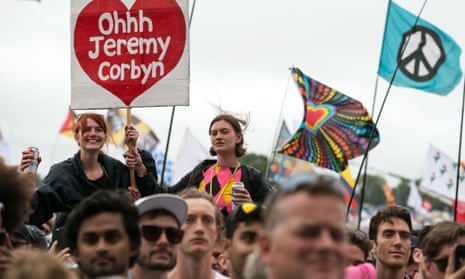More than twice as many voters under the age of 45 think Jeremy Corbyn’s Labour party is now “on their side”, compared with those who believe the same about Theresa May’s Tories, according to new polling that will send shockwaves through the Conservative party.
The survey for the Social Market Foundation (SMF) by Opinium shows it is not just voters in their teens and 20s but also those in their 30s and young middle age who now believe that the Tories do not speak for them.
The data, published as the Tory conference opens in Manchester, comes as senior ministers and MPs call for a fundamental rethink of the party’s offering to younger parts of the electorate following its catastrophic result in the snap general election called by the prime minister in June.
Writing on the Guardian website, Dr Phillip Lee, a government minister in the Ministry of Justice, says the Tory party is now a “huge turn-off” for most people under the age of 44. He says the party has a serious “trust problem”, adding that “more and more people see us as the party of the rich. And most people do not believe that Conservatives are on their side. This is a wake-up call.”
Among 18- to 24-year-olds, Opinium found just 15% of voters now say that the Tory party represents “people like me”. This rises to only 20% among those aged 25-34 and 21% among those between 35 and 44. Among these three age groups, the same percentage (76) think the Tories are more on the side of “richer people” than the less wealthy.
But it is the comparisons with Labour that will cause most concern in a party which under May has claimed that its priority is to help the less advantaged and privileged to progress in life.
A mere 19% of people aged 18 to 34 think the Tories are on their side compared with 53% who say Jeremy Corbyn and the Labour party is. Among all voters under 45, the same proportion (19%) think the Tories are on their side against 50% who say Labour is. Even among voters aged over 45 but under 65, Labour is ahead (see graphic). It is only among voters over 65 that the Tories are seen as more in tune with their needs than Labour. Some 39% in this group say the Tories are on their side, compared with 30% who say Labour is.
In separate policy areas the Tories are also seen as deeply out of touch by younger voters. Just 9% of 25- to 34-year-olds (an increasing proportion of whom cannot afford to buy their homes and have to rent) think the Conservatives are on the side of renters, while 32% say they speak mostly for homeowners. Only 25% of the 35-44 age group would consider voting Conservative, compared to 26% for those aged 25-34 and 22% for those aged 18-24. Among those aged 65-74 the figure is 51%.
James Kirkup, the SMF’s director, said: “The Conservatives’ problem is that you can’t expect people to support an economic settlement in which they have literally no stake. But years of stagnant wages and a dysfunctional housing market mean that many people are reaching their late 30s and 40s having worked hard for years, but are still unable to amass significant savings and or make a decent contribution to a pension, or buy a home.
“To many who don’t have property or savings, the Tories look dangerously like a party that wants to defend the interests of the people who already do own things and isn’t interested in helping more people to own things.”
Tory MP Paul Masterton said: “We don’t want to get to the stage where we’re seen as an analogue party in a digital age. If the party wants to win over young voters, it must become a dynamic force for modern, inclusive, open and, yes, liberal conservatism which speaks to their most basic of wants – the chance to buy their own home, a decent job, a safe environment for their families, and a fair crack at fulfilling their potential.”
Andrew Cooper, David Cameron’s former pollster, said the figures raised questions about the party’s ability to survive. “I think the Tory party’s younger voter problem is an existential threat, which has been compounding for at least 20 years and goes very deep – much too deep to be solved by a few eye-catching policies.”
Being identified as the Brexit party was a huge problem, Cooper added. “Both the idea of Brexit and the feelings that caused people to vote for it, and the consequences for Britain that those who voted for it were hoping to achieve, are all anathema to most people under 45 (just as the great majority of under-45s thought it was self-evident that gay people should be able to marry & were puzzled that there was even an argument about it). Being the Brexit party makes it even harder for the Tories to rebuild among younger voters.”
Craig Oliver, Cameron’s former communications director, said the problem was clear but the remedy less easy to deliver. “Brexit is a planet-sized issue that is sucking everything into its orbit, so having the capacity of separating yourself from it and focusing on the young and policies that work for them is very hard.”

Comments (…)
Sign in or create your Guardian account to join the discussion